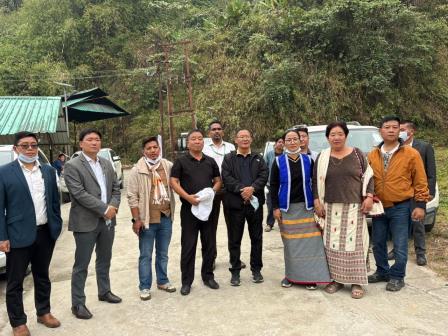-
COPU reviews state PSUs in second sitting
-
CM stresses on strong internal security, tech-driven policing
-
Cabinet approves proposals aimed at strengthening governance, enhancing public…
-
Body found hanging at bus stop with limbs tied sparks…
-
Mein chairs pre-budget consultative meeting with community based organisations
-
District level training on Census of India 2027 begins at…
-
WCD Minister reiterates commitment to safeguarding rights, dignity of…
-
Woman loses life in massive fire, two children seriously injured
-
 UA Minister inspects burial ground, focuses on maintenance and improvement
UA Minister inspects burial ground, focuses on maintenance and improvement
-
 UA Minister inspects burial ground, focuses on maintenance and improvement
UA Minister inspects burial ground, focuses on maintenance and improvement
Among the many thousands of legislations that have been framed since independence each with their own intentions, finding an equal to Right to Information Act, commonly known as RTI is a real difficulty, so far as outreach & popularity is concerned. Since its journey in 2005, it had captured the imagination of the aam janta as a very effective tool to fight corruption and has shot into stardom within this short span of time. And with more and more people from various sections of the society showing willingness to know about RTI, there are frequent workshops, symposia and similar other activities to propagate the potentials of this legislation. The recent workshop on it, at Government College Bomdila was one such.
It is not difficult to understand why the enactment of RTI Act is always hailed as a landmark in the history of public administration in India. If we look back and explore the nearly six-decade period prior to this Act, we find that the accountabilities that are normal to be expected from most of the public authorities were practically minimal. The electorally participative public who voted for formation of democratically elected governments and paid taxes regularly had no legal rights to know what’s going on inside, what processes are pursued in framing policies directly affecting their lives and who are the concerned officials associated with decision making process and execution of schemes. The single most popular and common enquiry was perhaps why the promises made for delivery of essential goods and services have failed to touch the intended beneficiaries. The veils of secrecy were everywhere under various pretexts, a culture inherited from the colonial era and the resulting corruption seemed uncontrollable.
But the growing consciousness of participatory democracy and equally escalating desire to know and participate in matters concerning the country or own self finally paved the way for birth of RTI Act which entered the arena with a sword having the double edges of ‘transparency and accountability’. Corruption is an evil which has always eaten the vitality of the administrative system in the country and has triggered various social, political and economic degradations. RTI has ensured greater access to information and had already made path breaking impacts in combating corruption. The credit for busting a slew of scams that had been exposed so far must go to RTI. Besides combating corruption, it has also shown its edge in promoting and upholding human rights and when it comes to investigative and analytical journalism it is quite a blessing for the fearless journalists.
Legal fraternity often defines RTI Act as a great sunshine law. It’s really so and all future amendments must be intended to reinforce it further.

Kenter Joya Riba
(Managing Editor)She is a graduate in Science with post graduation in Sociology from University of Pune. She has been in the media industry for nearly a decade. Before turning to print business, she has been associated with radio and television.
Email: kenterjoyaz@easternsentinel.in / editoreasternsentinel@gmail.com
Phone: 0360-2212313

